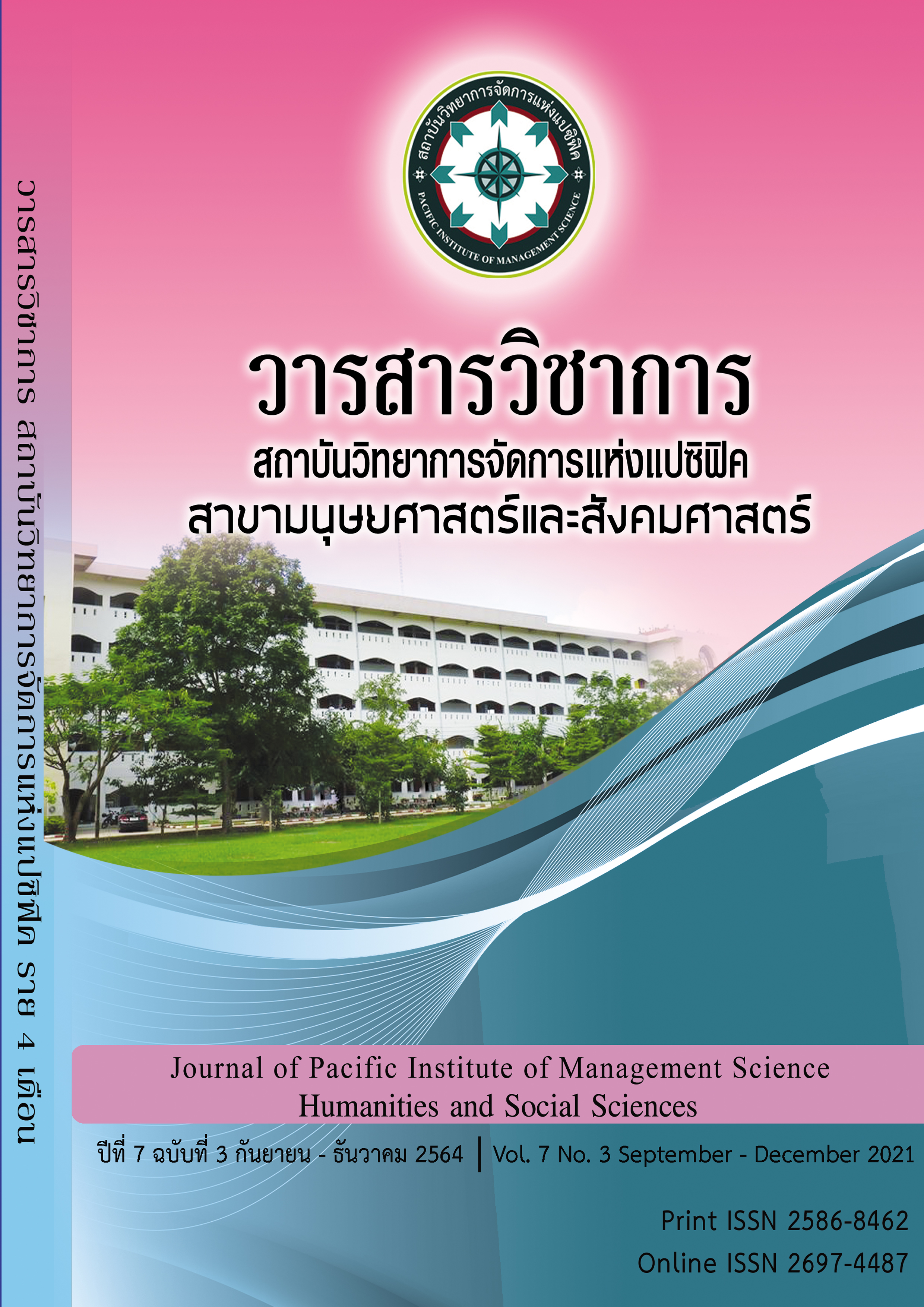Results of Cooperative Learning Management with Team-Game-Tournament (TGT) Technique and Open-Ended Problem on Ratios and Percentages Toward Mathematics Learning Achievement and Mathematical Problem-Solving Ability of Grade 7 Students
Keywords:
cooperative learning management with team – game – tournament (TGT) Technique and open – ended problem, mathematics learning achievement, mathematical problem – solving abilityAbstract
The purposes of this research were; to compare athematical learning achievement and to compare mathematical problem solving ability of the students after using cooperative learning management with team – game – tournament (TGT) with open – ended problem with a 70 percent criterion. The sample group was 38 grade 7 students of the 2019 at Bangpakong Brovonvittayayon School academic year who were selected by a cluster random sampling technique, The instruments of this research consisted of six lesson plans, a mathematical learning achievement and a mathematical problem – solving ability. The statistics for analyzing the data were means, standard deviation and t-test for one sample.
The research results that:
1. mathematical learning achievement of the students after using with cooperative learning management with team – game – tournament (TGT) with open – ended problem was higher than the 70 percent criterion at .01 level of significance.
2. mathematical problem – solving ability of students after using cooperative learning management with team – game – tournament (TGT) with open – ended problem with a 70 percent criterion at .01 level of significance.
References
กระทรวงศึกษาธิการ. (2551). เอกสารประกอบหลักสูตรแกนกลางการศึกษาขั้นพื้นฐาน พุทธศักราช 2551. โครงการ PISA ประเทศไทย.
บุญเลี้ยง ทุ่มทอง. (2554). การวิจัยการเรียนรู้ทางคณิตศาสตร์. มหาสารคาม: มหาวิทยาลัยมหาสารคาม.
พิมพันธ์ เดชะคุปต์. (2544). ตัวบ่งชี้ของการจัดการเรียนการสอนที่ยึดนักเรียนเป็นศูนย์กลาง. กรุงเทพฯ: สถาบันพัฒนาคุณวิชาการ.
ไมตรี อินทร์ประสิทธิ์. (2547). KKU Journal Of Mathematics Education ขอนแก่น: ศูนย์วิจัยคณิตศาสตร์ศึกษา.
สถาบันส่งเสริมการสอนวิทยาศาสตร์และเทคโนโลยี. (2559). ผลประชุมคณะกรรมการนโยบาย “สะเต็มศึกษา” กระทรวงศึกษาธิการ. [ระบบออนไลน์]. แหล่งที่มา www.ipst.ac.th/index/php.
สถาบันส่งเสริมการสอนวิทยาศาสตร์และเทคโนโลยี. (2555 ก). การวัดผลประเมินผลคณิตศาสตร์. กรุงเทพฯ: ซีเอ็ดยูเคชั่น.
สถาบันส่งเสริมการสอนวิทยาศาสตร์และเทคโนโลยี. (2555 ข). ทักษะและกระบวนการทางคณิตศาสตร์. พิมพ์ครั้งที่ 3 แก้ไขเพิ่มเติม. กรุงเทพฯ: 3-คิว มีเดีย.
สุรัช อินทสังข์. (2545). ปลายเปิด : ปัญหาคณิตศาสตร์ที่ไม่คุ้นเคย. การศึกษาวิทยาศาสตร์คณิตศาสตร์ และเทคโนโลยี. 31(121): 35-37.
สำนักวิชาการและมาตรฐานการศึกษา. (2551). แนวทางการจัดการเรียนรู้ ตามหลักสูตรแกนกลางการศึกษาขั้นพื้นฐาน พุทธศักราช 2551. พิมพ์ครั้งที่ 2. กรุงเทพฯ: โรงพิมพ์ชุมนุมสหกรณ์
การเกษตรแห่งประเทศไทย จำกัด.
Nohda, N. (1986, August). A Study of “Open - Approach” Method in School Mathematics Teaching Focusing on Mathematical Problem Solving Activities. Tsukuba Journal of Educational Study in Mathematics. 5: 19-31.
Sarcinelli, M.D. 1991. Research findings on the seven principles. In A.W. Chickering & Z.F. Gamson (Eds.), Applying the Seven Principles for Good Practice in Undergraduate Education. (pp. 13-25). San Francisco : Jossey – Bass.
Downloads
Published
Issue
Section
License
Copyright (c) 2022 Pacific Institute of Management Science

This work is licensed under a Creative Commons Attribution-NonCommercial-NoDerivatives 4.0 International License.
บทความที่ได้รับการตีพิมพ์เป็นลิขสิทธิ์ของ สถาบันวิทยาการจัดการแห่งแปซิฟิค
ข้อความที่ปรากฏในบทความแต่ละเรื่องในวารสารวิชาการเล่มนี้เป็นความคิดเห็นส่วนตัวของผู้เขียนแต่ละท่านไม่เกี่ยวข้องกับสถาบันวิทยาการจัดการแห่งแปซิฟิค และคณาจารย์ท่านอื่นๆในสถาบันฯ แต่อย่างใด ความรับผิดชอบองค์ประกอบทั้งหมดของบทความแต่ละเรื่องเป็นของผู้เขียนแต่ละท่าน หากมีความผิดพลาดใดๆ ผู้เขียนแต่ละท่านจะรับผิดชอบบทความของตนเองแต่ผู้เดียว







